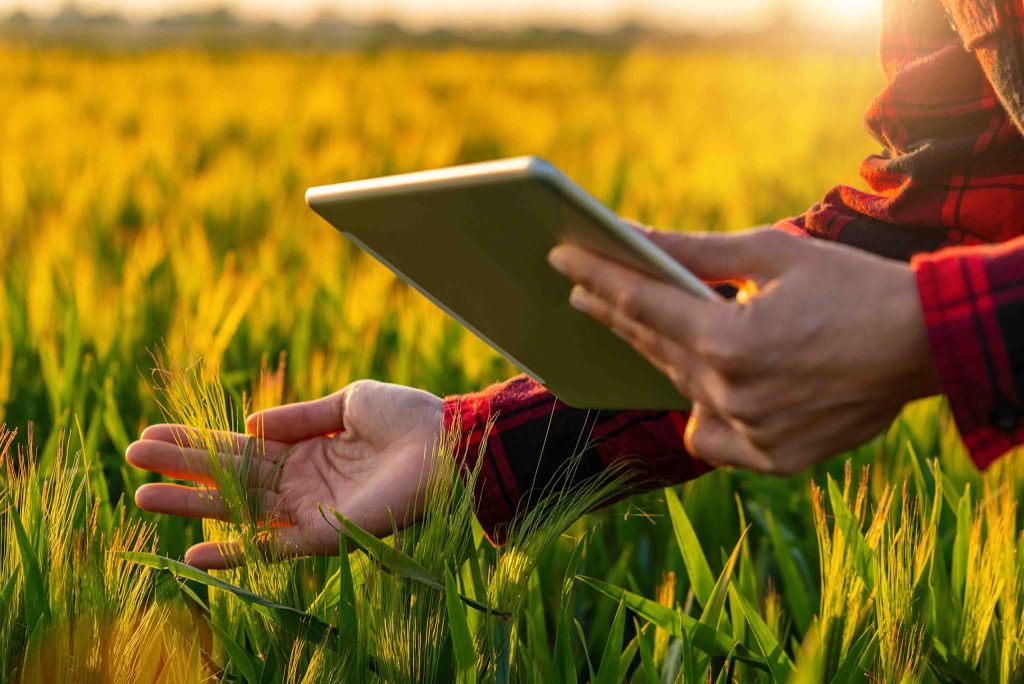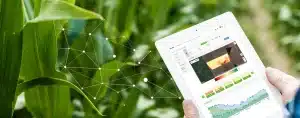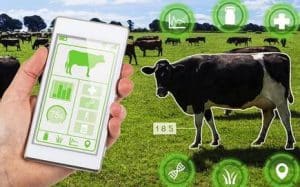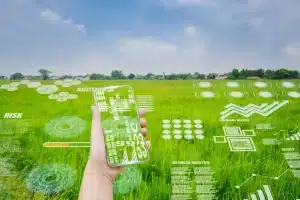Introduction
Gone are the days when a farmer had to face operational and logistical difficulties. Now, with the help of a farm management system, it is easier to optimize all operations with precision and efficiency, reducing costs.
With the help of such modern day software, farmers can effectively manage records, inventory, etc. Thus, choosing the right software becomes equally important as it must align with your needs.
In this blog, we will discuss the best crop management software and the essential factors for considering it.
What is a Crop Management System?
A farm Crop Management System or Software, also called Crop Planning Software, monitors and optimizes crop production on a farm. It helps farmers, agronomists, etc., understand the variables and costs that impact overall crop profitability through smart data management. Crop Management Software allows accurate and up-to-date crop records, food tracking, and traceability. Thus, the software streamlines and monitors the performance of a crop and food supply chain life cycle.
Crop Management Software allows you to gather and examine crop data, such as crop health, soil quality, weather patterns, and growth rates, to make informed decisions about harvesting, planting, watering, and fertilizing.Implementing this software enables farmers to keep a check on safety audits and compliance reports.
Who Uses a Crop Management System?
People across the agriculture sector, such as agronomists, farmers, organizations, growers, researchers, etc., use a Crop Management System to understand the cost and variables that may affect crop profitability and maintain records to track and trace crops.
Organizations include food businesses, farming companies, supervisors and field leaders, government agencies, the C-suite, and development agencies.
Why use a Farm Crop Management System?
Crop Survey Management Systems are crucial in the farming industry. Resource accountability means keeping track of all resources, such as machinery, chemicals, livestock feed, etc., and maintaining a resource budget to ensure they are correctly used. Moreover, with the help of a Farm Crop Management System, farmers can anticipate and track associated risks through helpful analytics, and crop planning software also helps save labor costs.
What are the key advantages of Crop Management Software?
Grain Management is not just about growing crops. Other aspects, such as payments, deliveries, contracts, and crop storage, are also crucial, and a Farm Crop Management System is streamlined for every aspect.
- Real-Time Insights: The Farm Crop Management System offers real-time tracking of grain inventory, such as stock levels, transactions, etc., to control the proper management of crops.
- Enhanced productivity: The Crop Management Aapp helps increase productivity and reduce manual efforts, letting you focus on decision-making.
- Improved tracking capabilities: The Crop Management software has tracking tools to trace crops from farms to storage locations. This is mandatory due to increasing consumer demands for traceability and safe food production.
- Data-Driven decision making: Crop Monitoring Software gathers and records crop related information such as weather forecasts, pest infestations, agriculture cycles, etc., allowing farmers to make informed decisions to increase productivity and quality.
- Secure data storage: Crop Planning and Management Software has a centralized database to store crop related information, eliminating the need for paper records, which can sometimes lead to human errors.
- Remote accessibility: The mobile-friendly Crop Management App lets farmers access and manage crop information from anywhere using smartphones or tablets.
What are Crop Management Practices?
Implementing Crop Management practices to achieve success is the key to sustainable agriculture. Here are the key Crop Management practices mentioned below:
- Fertilization: Chemical or natural substances added to the soil to increase fertility, called fertilization. These substances help plants grow better, and the right amount of nutrition is crucial.
- Irrigation: Irrigation refers to giving water to plants to grow; reducing the water supply will lead to undergrowth, and excessive water will result in soil erosion. Thus, a sufficient water supply is essential.
- Harvesting: This is the process of harvesting crops after they mature. Harvesting depends not only on crop maturity but also on weather conditions, moisture, etc.
- Nutrient Management: It includes a fertilization plan that is important to match the nutrients required by the growing crops.
- Crop Rotation: It means growing different crops on the same land to preserve soil nutrients.
- Soil Cultivation: Soil Cultivation is about maintaining soil fertility, stability, and other characteristics, as well as identifying and minimizing the risk of erosion.
- Crop Protection: Crop Protection is associated with protecting crops from pests, weeds, and diseases.
10 of the Best Crop Management Software in 2025
According to Statista, the size of the Farm Management Software market is expected to grow at a CAGR of 17.47 percent from 2021 to 2026. Check out the best Crop Management Software below that you may consider:
AgriChain: AgriChain is a Supply Chain Management Software that connects agricultural supply chain stakeholders, enabling better decisions, reducing paperwork, and increasing efficiency. AgriChain’s Agri Software revolutionizes farm management, serving as a comprehensive farm record-keeping app. It allows farmers to track operations from harvest to execution, ensuring detailed documentation for future analysis.
Crop Planning and Management Software offers a transparent, trustworthy platform for managing global agricultural product movement. It builds networks among stakeholders, improves time to market, and reduces costs and inefficiencies.
Features:
- Secure data storage system
- Real time tracking.
- Mobile app and dedicated web app.
- Increase productivity and enhance decision making.
- Keep track of crop livestock and locations.
- Keep track of financial aspects such as crop and potential sale prices around the year.
Farmbrite: Farmbrite is an all in one Farm Software for modern farmers and ranchers. Plan, track, sell, and improve from one easy to use platform integrated Farm and Livestock Management to run a thriving agriculture business. Farm Brite offers comprehensive Farm Software for Livestock and Crop Management. It tracks crop health, production, and soil conditions. The Livestock Module handles breed management, grazing rotations, and animal health. It secures critical records and improves yields. Farm Brite also provides an e-commerce platform for direct online sales, helping farmers streamline operations and boost productivity.
Trace Agtech: Trace Agtech is a comprehensive Farm Management Software that unifies contract farms and farmers on one platform. It offers tools for traceability, sustainable agriculture, and smart farming. The customizable system covers data collection, reporting, monitoring, and management.
Trace Agtech’s services include Agronomy, Analytics, and Business. It digitizes farm operations, supports farmers, tracks expenses, forecasts yields, manages quality control, ensures traceability, and handles inventory and factory operations.
Granular: Granular is a powerful Farm Management tool that optimizes operations through data driven insights. TheCcrop Monitoring Software is for crop planning, inventory tracking, and financial analysis, helping farmers boost profitability.
The multi location feature allows viewing diverse terrains in one window, improving efficiency. Granular’s “Farming for the Future” approach provides deep insights through data management, geo mapping, seed variegation, and yield forecasting.
Granular Insights offers financial charts and agronomic map layers for timely decision making. Their agronomy feature enhances soil productivity to meet field goals while streamlining business and team management.
Agworld: Agworld is a Farm Data Management System that facilitates collaboration between farmers and advisors. Users can collect and share operational data, enabling teamwork among various stakeholders. It allows agronomic and financial performance analysis at the field level to manage risk and boost profitability.
Crop Tracker: Croptracker’s Farm Management Software helps fruit and vegetable farmers manage operations efficiently. It enables accurate record keeping, performance measurement, and cost tracking. Users can schedule activities and guide crews while monitoring progress. The Crop Monitoring Software offers a comprehensive agriculture management system, labor and production cost tracking, progress monitoring, etc.
Conservis: Conservis is a Farm Management Software that digitizes recordkeeping, inventory, and logistics. It helps farmers plan work, track field activities, and project costs. By analyzing farm data, Conservis provides insights into the monetary flow for crops and livestock. This tool streamlines operations, boosts efficiency, and optimizes management processes for modern farmers.
Trimble: Trimble offers innovative solutions across industries, including agriculture. Their precision farming assistance helps global agricultural ventures while prioritizing environmental sustainability. Services cover land preparation, planting, implement control, input management, harvesting, and water management.
Trimble Ag Software is a comprehensive field management tool integrated with precision agriculture equipment. It enables farmers to make data driven decisions, maximizing efficiency in planting, nutrient application, and irrigation.
Farm ERP: Farm ERP is a versatile platform that supports agricultural stakeholders across the value chain. It offers solutions for planning and management, accounting and inventory, sales, and more. Farm ERP streamlines operations and enhances efficiency in various agricultural sectors.
FarmLogs: In the US farm management tool landscape, FarmLogs has become a standout app since 2011. It aims to simplify farming by offering easy to use features, live tracking of field conditions, weather data, crop health insights, etc. FarmLogs also gives farmers flexible pricing options with add-ons to match their unique needs.
Factors to look out for while choosing the right Crop Management System
It’s important to consider your business needs while looking for a Crop Management System, but how do you choose the best crop monitoring software? Below are the few factors you must consider while making this crucial decision.
- Cost: Cost plays a vital role in choosing the Crop Monitoring Software, as it must fit your budget requirements. Thus, look for an affordable system that fulfills all your business requirements.
- Mobile friendly: Look for software with a Crop Management App that is mobile app friendly. This app lets users access and update the records anywhere and anytime, giving farmers more time in the fields.
- Compatibility with other software: To easily link the software with other third-party platforms, it is best to consider its compatibility with your existing software.
- Security: Look for a system that offers data safety, such as SSL-encrypted connections. Ensure there is a regular data backup.
- Easy to use: The Farm Crop Management system must be easy to use and offer seamless navigation, ensuring it is user-friendly.
- Storage: The Crop Planning Software must have centralized software, eliminating the need for paperwork to manage the inventory and real-time tracking.
Conclusion
Business practices are changing due to technological advancement and the emergence of software for better business decisions.
If you are looking for software, decision making about the right Farm Crop Management system becomes essential to increase a farm’s productivity and efficiency. While deciding on the right Crop Management Software, look for software that offers seamless integration, aligns with requirements, and is easy to use is always best. Thus, with the help of Crop Management Software, farmers can easily monitor and optimize crop production deeply to understand the cost that impacts overall crop profitability.
FAQs on Crop Management System
What is Crop Management Software?
Crop Management Software is a tool farmers, agronomists, and others use to optimize crop operations. It helps improve productivity and operational efficiency by letting farmers keep and track records, use real-time tracking, and make the right decisions. The Crop Management Software is designed to manage various aspects of farming, such as pest control, irrigation, planting, etc., letting farmers manage production costs and make data driven decisions.
How does Crop Management Software help in enhancing farm productivity?
A farm Crop Management System helps collect data and gain real time insights. It also enhances collaboration and supply chain, data driven decision making, improved efficiency, resource allocation, etc.
Is it possible to integrate Crop Management Software with other Crop Management tools?
Yes, it is possible to integrate a Crop Survey Management System with various Crop Management Tools, as these tools have integration capabilities with third party tools for seamless data exchange and interoperability.
What are the different kinds of Farm Management Software?
There are two types of Farm Management Software: software for large and small farms. Large farms require large scale farming insights, such as compliance issues, livestock, and supplier records, and vice versa.
What are the new trends related to Farm Management Software?
Future trends in Crop Planning Software include using machine learning, AI, blockchain, etc., to make crucial decisions about crop yields, image recognition, farm aerial views, and geo-tagging through drones.
What are the features of Farm Management Software?
Farm Management Software features include mapping, livestock management, inventory management, labor tracking, agriculture compliance, and financial analytics.












